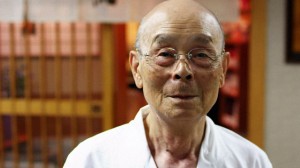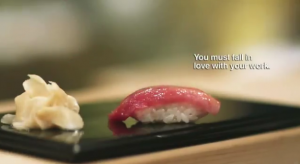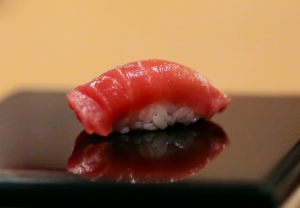The other night my husband and I watched a spare and elegant documentary called “Jiro Dreams of Sushi.” It’s the story of 85-year-old Jiro Ono, owner of the Michelin 3-star restaurant Sukiyabashi Jiro in Tokyo. Although he is already considered to be one of the world’s greatest sushi chefs, Jiro wants to perfect the art form and elevate the delicacy to new heights. His quest becomes an obsession, to the point where Jiro even dreams of sushi.
Of course, the film isn’t just about the sushi. I paused the movie and asked my husband if he feels a similar obsession for his profession.
“Do you dream about teaching?” I asked.
“All the time,” he said. “Do you dream about writing?”
“I do. Scenes and characters and things I haven’t even written yet.”
“When you worked for newspapers, did you ever dream about journalism?” he said.
“Yes. But only in the nightmare way.”
And that’s right about the time I had a writing epiphany. Because when I pressed play and the film started up again, Jiro looked directly into the camera and said, “I fell in love with my work and devoted my life to it.”
Now, I’ve always heard the old cliché, “It’s not work if you love what you do.” But Jiro’s take on it is slightly different.
When Jiro says “fall in love with your work,” he isn’t talking about having a strong affection for your chosen career path. This is a matter of loyalty. It’s doing this thing for richer or poorer, in sickness and in health, as long as you live. Jiro fell in love, and he made a lifetime commitment — the guy has been creating sushi since age 10, and I bet making sushi will be the last thing he ever does.
For me personally, that means putting my ass in the chair and writing, even when the mail brings me nothing but rejection letters, even when I’m scrounging for grocery money, even when I wonder why I bother. It means standing by writing’s side, even when she is a nagging whorebeast who refuses to do the dishes.
It means that I’ve already made the commitment — I quit the only career I’ve ever known; I sent myself back to school to learn more about the craft; I’m giving myself ample time and opportunity to write. Now it’s time to see it through. No more messing around. If I’m going to be putting my ass in the chair anyway, don’t I owe it to myself to be the best possible writer I can be?
Sounds so simple. But, then again, so does sushi. And Jiro’s been working on that for 75 years.
Later in the film, a Japanese food critic ticks off the five attributes that separate great chefs from average chefs. I believe these attributes could apply to anyone, no matter the field.
1. “They take their work very seriously and consistently perform at the highest level.” — Strive for excellence, which requires unyielding focus and determination. Sacrifices must be made.
2. “They aspire to improve their skills.” — There is always room to learn something about your craft. The day Jiro received an award that declared him to be a national Japanese treasure, do you know what he did? He returned to work.
3. “Cleanliness. ‘If the restaurant doesn’t feel clean, the food isn’t going to taste good.'” — Keep it simple. You want your readers/customers to focus on the thing they showed up to do — and they’re here to savor your work.
4. “They are better leaders than collaborators. They’re stubborn and insist on having it their way.” — Trust your instincts. Don’t accept substitutes for your vision.
5. “Finally, a great chef is passionate.” — Fall in love with your work every single day, all over again. Wine her, dine her and slip her the tongue. It’s your job to make this relationship work.



